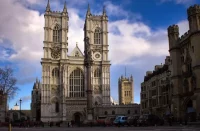Among the most appealing aspects of CS Lewis’ children’s fiction is at the point that I would describe as “turning the corner.” It is not that he creates a fantasy world, but that the fantasy world he creates somehow intersects with the world in which we live. It is the discovery that at this moment, quite unexpectedly, the back of an old wardrobe is a door into another world.
You turn the corner, and…
It certainly intersects with something every child feels – the sense of surprise and the encounter with the unexpected.
Some years back when our parish was just beginning, we occupied a storefront location next to a dime store. The space where I parked my car was hidden by a head-high bush. One morning, coming in to the parish, I could hear a young girl playing on the other side of the bush. Based on her fantasy monologue, I could hear that she was somewhere in a Harry Potter novel. As I stepped around the bush, she turned and saw me. I was wearing a gray cassock, was bearded, and even wore a pony-tail at the time. Her mouth opened wide and her eyes wider as she stared at me. I smiled.
“You…you’re beautiful!” she stammered.
I have never been more delighted to be an object of wonder. It was a reaction far removed from the fairly frequent looks of consternation on the faces of adults who are clearly disturbed that something so strange should be walking freely about their city.
The child’s reaction is not a mark of immaturity – but a mark of a human being still capable of belief.
In a secularized culture expectations are reduced to a minimum. Whatever occurs, nothing will be “out of this world.” Whatever corners are turned, what awaits is always more of the same. But there are exceptions.
Charles Taylor in his magisterial work, A Secular Age, writes of a sense of “fullness”:
In this case, the sense of fullness came in an experience which unsettles and breaks through our ordinary sense of being in the world, with its familiar objects, activities and points of reference. These may be moments, as Peter Berger puts it, describing the work of Robert Musil, when “ordinary reality is ‘abolished’ and something terrifyingly other shines through”, a state of consciousness which Musil describes as der andere Zustand (the other condition).
Even more surprising is the recent case of Sam Harris (a noted atheist and writer) describing an experience he had by the Sea of Galilee. In his book, Waking Up, he relates:
As I gazed at the surrounding hills, a feeling of peace came over me. It soon grew to a blissful stillness that silenced my thoughts. In an instant, the sense of being a separate self — an ‘I’ or a ‘me’ — vanished.
Harris does not come to the conclusions of a believer, but he recognizes experiences that point towards something often overlooked.
My personal reflection is that Harris sold the experience short and could have gone further (deeper). But, in many ways, his experience fails precisely because he turns back to the self (ego).
In either case, there is and always has been an aspect of human experience of that which is “just around the corner.” I prefer Taylor’s term of “fullness” on account of its place within the Christian tradition.
It is one thing to speak of an experience of God, quite another to speak of an experience of the “fullness” of God. In the apprehension of fullness, the self recedes, even to the point of disappearance, while the fullness “fills” everything (hence the language of fullness).
This is, interestingly, language that is associated with the Holy Spirit. In the New Testament, the Spirit “fills.” Persons not only receive the Holy Spirit, they are “filled” with the Spirit. The prayers of the Church address the Holy Spirit as “filling all things.”
 It is difficult to describe the sense of “fullness,” other than to say that it refers to a completion, to a superabundance, to something of which there cannot be more. This is in contrast to the experience of emptiness and lack, the nagging disappointment that accompanies our adult existence and our encounter with the world.
It is difficult to describe the sense of “fullness,” other than to say that it refers to a completion, to a superabundance, to something of which there cannot be more. This is in contrast to the experience of emptiness and lack, the nagging disappointment that accompanies our adult existence and our encounter with the world.
In our family tradition, our youngest daughter always seemed to summarize our Christmas experience with, “This is the best Christmas ever!” Of course, as a parent, it is almost never the “best Christmas ever.” The time of year is too fraught with contradictions and concerns. The magic of a child, however, sees a fullness:
“You… You’re beautiful!”
This brings me back to Lewis’ intuition with a simple question: Is there anything of note just around the corner? Jesus’ parables surrounding the Kingdom of God suggest that there is.
Again, the kingdom of heaven is like treasure hidden in a field, which a man found and hid; and for joy over it he goes and sells all that he has and buys that field. Again, the kingdom of heaven is like a merchant seeking beautiful pearls, who, when he had found one pearl of great price, went and sold all that he had and bought it. (Mat 13:44-46)
The Orthodox tradition points to this deeper reality as a quality to be found everywhere (the fullness is “everywhere present”). It is not a quality, or a reality that forces itself on our awareness. Instead, it is a quality of which we are normally not aware – and we are not aware because the lacking is within us.
This lacking is the very aspect of our lives that is addressed by repentance. The cry, “Repent, for the Kingdom of God is at hand!” is not an enjoinment to moral improvement. It is a call to recognize the very emptiness, the lacking within ourselves. Repentance is the personal recognition that Christ’s word is fulfilled in us: “Apart from Me you can do nothing.”
Oddly, it is the very border of such an experience described by the atheist, Sam Harris: “a blissful stillness that silenced my thoughts…. the sense of being a separate self — an ‘I’ or a ‘me’ — vanished.” His experience falls short of repentance in that he fails to admit that the experience is true. His thoughts, his “separate self,” is indeed, nothing, or bordering on nothing. He thinks that he is something, a man among men, an author, a thinker, a knower, one who considers the universe. He could have gone further had he sung, “All we are is dust in the wind.”
But the emptiness of self, the knowledge that we are but dust, is known by many. That we are nothing does not immediately reveal what is around the corner. That fullness is a recognition given as a gift. It can come quite unbidden. Treasures hidden in fields are most often discovered without maps.
The Orthodox life is the purchase of the field, the buying of the pearl. Finding the treasure and the pearl of great price is the gift of God. Around-the-next-corner just reveals itself to us. Then we labor and pray, sell what we have, share with others, forgive enemies, and repeatedly acknowledge the dust of our existence that we might live around the next corner in the fullness that God Himself.
I have suffered the loss of all things, and count them as rubbish, that I may gain Christ and be found in Him, not having my own righteousness, which is from the law, but that which is through faith in Christ, the righteousness which is from God by faith; that I may know Him and the power of His resurrection, and the communion of His sufferings, being conformed to His death, if, by any means, I may attain to the resurrection from the dead. Not that I have already attained, or am already perfected; but I press on, that I may lay hold of that for which Christ Jesus has also laid hold of me. Brethren, I do not count myself to have apprehended; but one thing I do, forgetting those things which are behind and reaching forward to those things which are ahead, I press toward the goal for the prize of the upward call of God in Christ Jesus. Therefore let us, as many as are mature, have this mind; and if in anything you think otherwise, God will reveal even this to you. (Phi 3:8-15)
Source: Glory To God For All Things














Comments